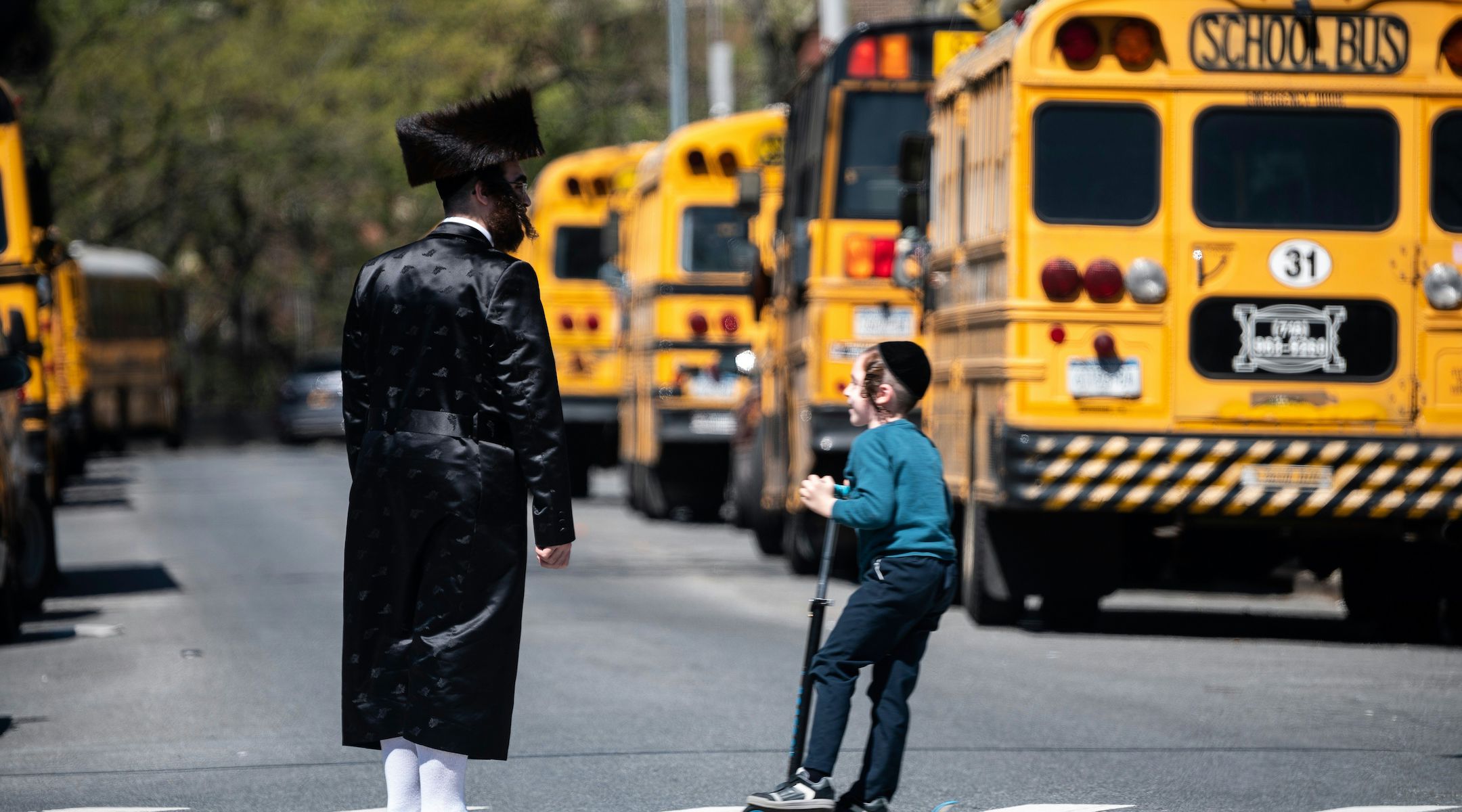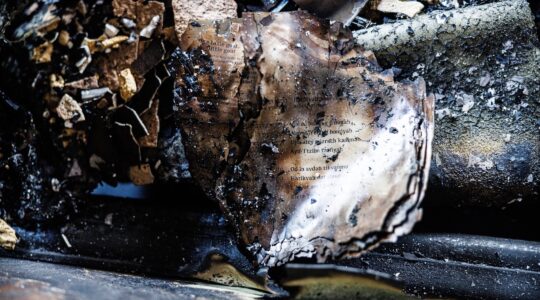NEW YORK (JTA) — Gene Steinberg was born and raised barely an hour outside New York City, but well into adulthood he could barely speak the language of his native country.
Raised in a mostly Hasidic community 50 miles northwest of Manhattan, Steinberg, now 43, attended schools where Yiddish was the primary language of instruction. Until age 12, he received only an hour of instruction in secular subjects each day. After that, the number dropped to zero. From early morning until late in the evening, he spent his time immersed in the study of Jewish texts.
When he went to enroll at a community college at the age of 37, he was told he had to take an English class aimed at new immigrants.
“I had a conversation with the person in charge and the first question she asked me [was], ‘When did you immigrate? What year?’” Steinberg recalled. “And I tried to explain to her, I didn’t immigrate. I was born here.”
In Kiryas Joel, a village in Orange County, New York, where the majority of residents are Yiddish speakers affiliated with the Satmar Hasidic sect, he “learned almost nothing, even in basic English, basic math,” he said.
After deciding he no longer wanted to live a Hasidic lifestyle, Steinberg signed up for classes at Rockland Community College, which directed him to enroll in a remedial program to prepare him for college-level coursework. When he tried to take an introductory biology class, he found that he lacked even basic scientific knowledge.
“Almost every class had instances like that where I had a void where I couldn’t understand and needed to catch up because I was missing basic education. And then I also found I had to study three times as long as the average student in my class,” recalled Steinberg, who founded a support group for formerly haredi Jews called Freidom in 2012.
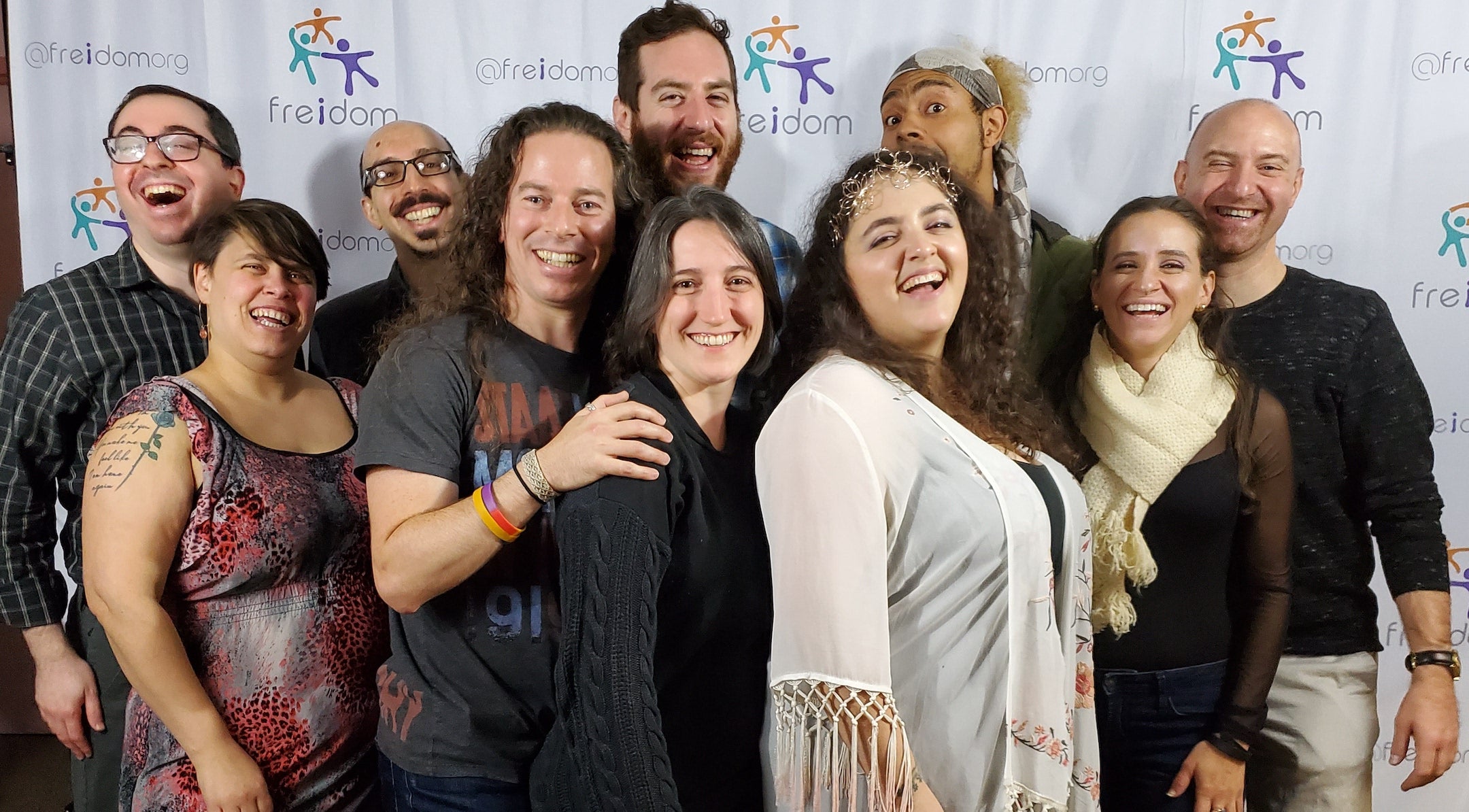
Gene Steinberg, second from left in front row, with members of Freidom, the support group he founded for former haredi Orthodox Jews. (Freidom)
A new proposal by New York State’s Department of Education seeks to address the struggles faced by Steinberg and other graduates of haredi private schools. The new regulations would force yeshivas to ensure that students receive a secular education that is at least as good as that which public schools provide.
In theory, yeshivas are supposed to be doing that already. New York state requires private schools to provide an education that is “substantially equivalent” to what public schools offer. Critics have long charged that many Orthodox schools fall well short of that standard, but their efforts to address the problem have been stymied by powerful Orthodox community members. Last year, state senator Simcha Felder held up the passage of the state budget to stop New York from interfering in the curriculum at yeshivas. Felder is a rabbi and represents a heavily Orthodox district in Brooklyn.
The new proposal would put some regulatory muscle behind existing laws. They specify how many hours must be devoted to each secular subject and require schools to provide additional instruction to students with limited knowledge of English. Schools that don’t comply risk losing crucial state funding.
The ideas were celebrated by many as a long overdue remedy to a glaring problem in Orthodox schools, but they also have their share of critics. After the Education Department first proposed the new rules in November 2018, lawsuits were filed on behalf of Orthodox yeshivas, as well as Catholic and other independent schools in the state. Critics claimed the rules were too intrusive and impaired their ability to provide a quality religious education to their students.
“The large majority of Jewish schools across New York state would have to make significant changes in their daily schedules and de-emphasize considerably the Jewish studies part of the day — and, in a certain sense, compromise the very mission that these schools were created to carry forward,” Rabbi Chaim Dovid Zwiebel told the Jewish Telegraphic Agency.
Zwiebel is the executive vice-president of the haredi umbrella group Agudath Israel of America and serves on the executive committee of Parents for Educational and Religious Liberty in Schools, an advocacy group created to resist efforts to impose more rigorous secular education standards on Orthodox schools.
According to Zwiebel, there are some 160,000 students studying at about 450 yeshiva schools in the state, and most of those schools would need to significantly alter their curriculum under the proposed regulations. A better approach, he says, is to work with struggling schools individually to improve secular education.
“We have to work on those things and get them straight and do it on individual school-by-school basis rather than creating a new aggressive oversight structure that goes, as far as I’m aware, beyond that which exists in any other of the 50 states,” he said.
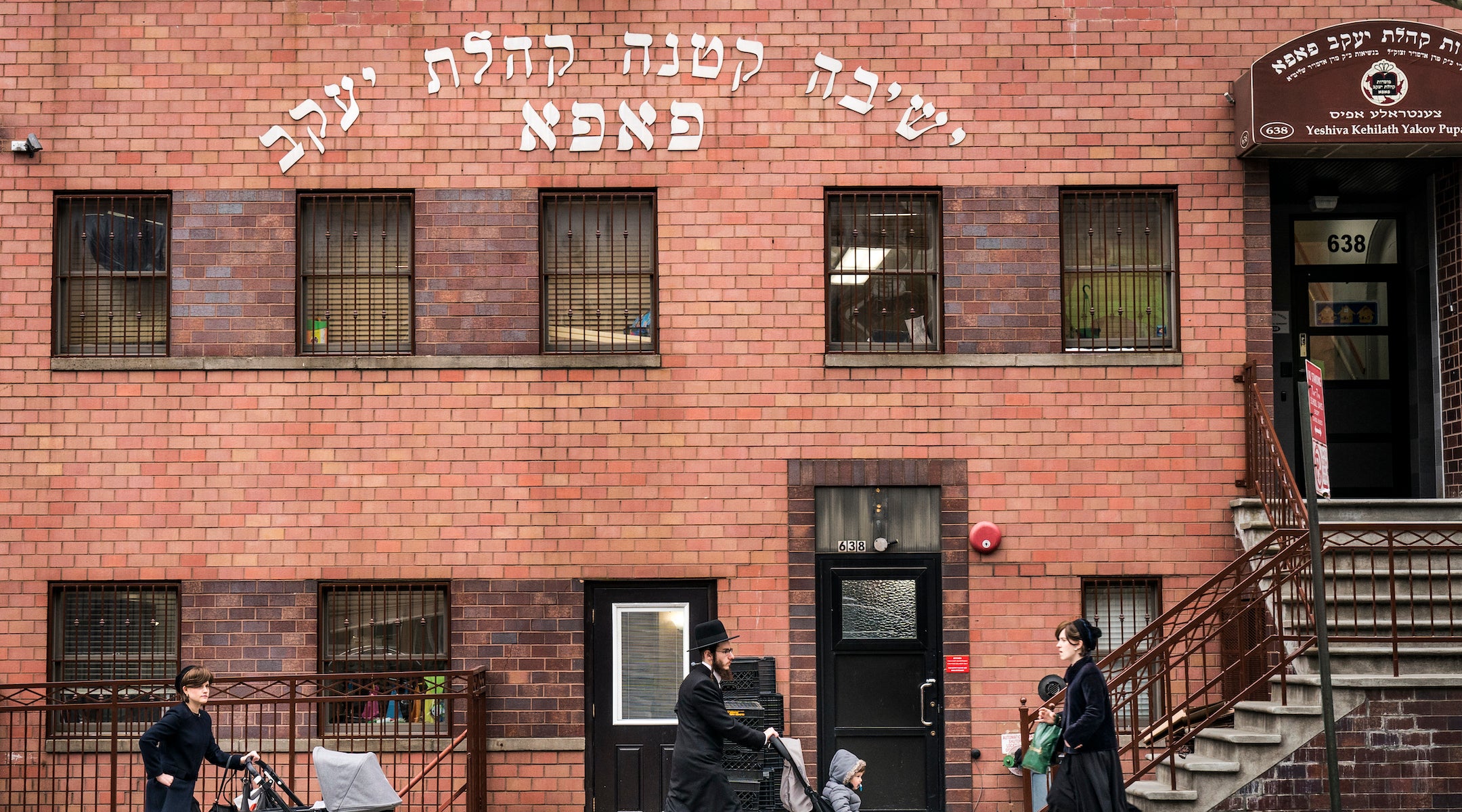
Pedestrians walk past the Yeshiva Kehilath Yakov School in South Williamsburg, Brooklyn, April 9, 2019. (Drew Angerer/Getty Images)
A similar fight has been playing out in Israel, where attempts by the government to enforce general education standards on publicly-funded haredi schools were met with fierce pushback from community leaders and their political representatives. Some Orthodox schools in Israel receive exemptions that free them from having to provide core classes in math, science, English and other subjects. Only 12 percent of haredi students received matriculation certificates in the 2015-16 school year, far lower than the 77 percent of students who did so in secular and modern Orthodox schools, according to a 2018 report by the Israel Democracy Institute.
As in Israel, some members of the haredi community in New York worry that the proposed regulations are part of a larger effort to change their way of life.
“The danger is that if you try to change one thing, it will not stop there. Tomorrow you will say that we need to change our dress code, the way of our beliefs, and so on,” said Volvi Einhorn, 28, a yeshiva graduate who now works at a design firm in Brooklyn.
Einhorn said that ultra-Orthodox Jews can do well professionally thanks to the support they receive from others in the community. But Steinberg says that still leaves many people working at jobs far below their potential and does nothing to help people who decide they don’t want to live a haredi lifestyle.
“What if I happen to not want to be part of the community anymore?” Steinberg said.
Under the proposed rules, private schools that don’t comply with the regulations would lose funding for textbooks, transportation and other state services. If schools don’t comply and parents continue to send their kids there, the parents could potentially face jail time. The Education Department held a public commenting period that ended in September and is currently considering whether to enact the proposal.
The proposed regulations stem from a 2015 complaint to New York City’s Education Department by former students of 39 Orthodox schools who alleged that they had not received sufficient instruction in secular studies, particularly English.
The letter was organized by Young Advocates for Fair Education, or Yaffed, which advocates for improved education in Orthodox schools. Its founder, Naftuli Moster, grew up attending Hasidic yeshivas in the Brooklyn neighborhood of Borough Park and says he graduated barely being able to speak English.
“[The yeshivas] want to continue doing what they’ve been doing, which in our view is mass educational neglect and depriving kids of an education, subjecting them to lives of poverty and dependence on government assistance,” Moster told JTA.
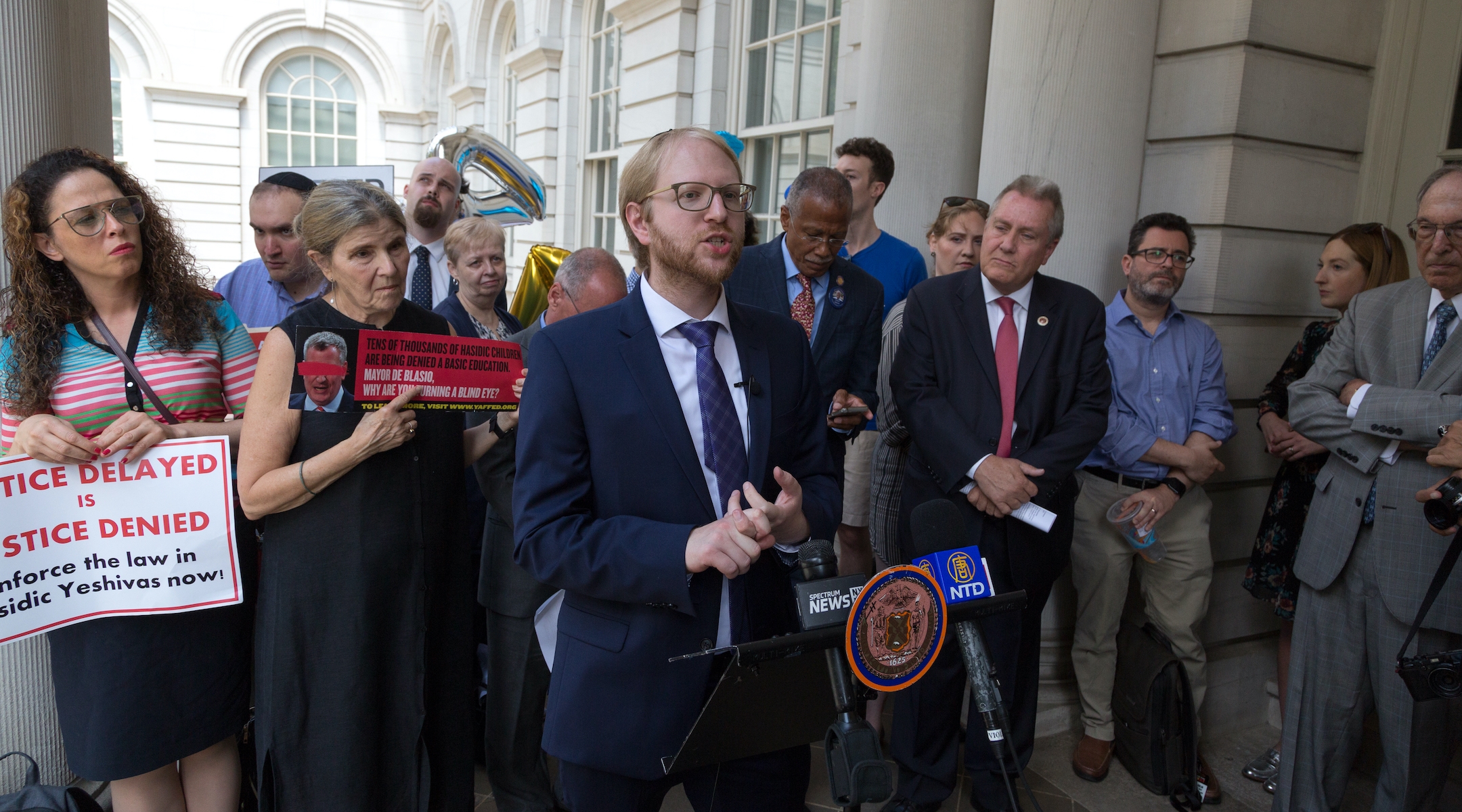
Naftuli Moster speaking at a press conference for Yaffed outside New York’s City Hall, July 24, 2019. (Mo Gelber/Yaffed)
A 2017 report by his organization claims that up to age 13, the average student at a boys’ Hasidic yeshiva receives only about six hours per week of instruction in secular studies. After that, they receive no further secular education, the report claims.
The proposed regulations would likely affect haredi boys more than girls. The community emphasizes religious studies for men and many women are expected to work while their husbands study in yeshivas, which means that girls generally receive a more comprehensive secular education.
“We got the shorter end of the stick when it comes to Judaic studies, absolutely … but the boys definitely got the shorter end of stick when it comes to secular education,” said Frimet Goldberger, 34, who like Steinberg grew up in Kiryas Joel but has since left the Satmar Orthodox community.
A journalist who has written about her experience growing up in a Hasidic community, Goldberger said women in such communities are expected to help their husbands with daily tasks that required communicating in English.
“I understood that I would get married and I would have to assist my husband when he went to the doctor,” said Goldberger.
Shulim Leifer, 34, graduated from yeshiva in Borough Park with better English skills than many of his classmates because his family spoke both English and Yiddish at home. Today Leifer manages several nursing homes, but he says his career prospects were severely limited because of the lack of secular education he received.
“We’re not starting off with the basic starting point that one would imagine is in a thriving society,” he said. “We can’t decide in our teens that we’re going to be a doctor, or we’re going to be a lawyer, or we’re going to be an accountant or we’re going to be an astronaut, or anything really.”
Leifer dismissed arguments that the proposed regulations would hurt yeshivas’ abilities to teach Jewish subjects as “blatant fear mongering.”
“That is not true that there will be no space left for it,” he said. “It is simply an acknowledgement that what is being currently being taught for the kids is preparing them only for Jewish life and if they have no means they can’t even accomplish that, and that’s just not fair.”
JTA has documented Jewish history in real-time for over a century. Keep our journalism strong by joining us in supporting independent, award-winning reporting.
